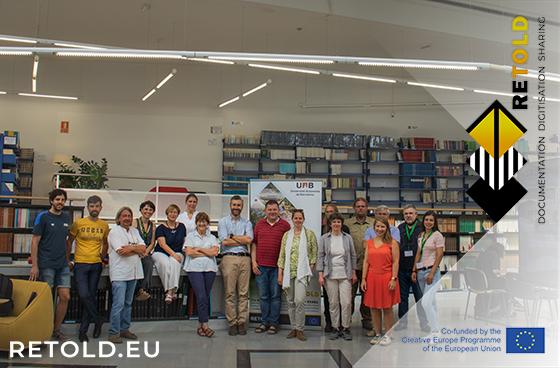
After 18 months of working together digitally, we finally were able to meet in person in Barcelona at the beginning of June. Paloma González-Marcén and Clara Masiera Esquerra as well as the rest of the team at the Universitat Autónoma de Barcelona (ES) were our welcoming hosts for the conference.
The aim was to introduce the RETOLD project to a wider public of specialists and students as well as to test the prototype.
On the morning of 7 June 2022, we started with a series of lectures around digital archaeological heritage presented by several keynote speakers. At first, EXARC director Roeland Paardekooper introduced the RETOLD project and its importance. Joan Anton Barceló (UAB, ES) challenged whether archaeologists can be replaced by a machine in his talk Intelligent Archaeology through Technology. Nicolò dell'Unto (Lund University, SE) introduced the Research Assets in the Digital Space and showed us the potential of 3D web platforms that can support archaeological research. Sofia Pescarin (CNR ISPC, IT) showed us the new challenges of virtual heritage but also how it can facilitate knowledge acquisition. Héctor Orengo (ICAC, ES) gave an overview of the Current computational approaches to archaeological research and showed us the options archaeologists have when using advanced remote sensing technologies to study past societies. The last speaker was Oriol Vicente (UAB, ES) who presented the work of the UAB Open Lab and the virtual exhibition they created with 3D scanned objects.
In the afternoon, the RETOLD partners including two Spanish museums tested the prototype. Cordula Hansen from Nüwa had designed a digital prototype based on the paper forms to document reconstructed houses created by Julia Heeb from the Museumsdorf Düppel. We were looking at workflow, practicality, and simplicity. With the product we are creating, we want to ensure higher quality research through more comparable data, the preservation of tacit cultural heritage knowledge, and opportunities for more engaging and impactful storytelling about cultural heritage to the general public. Every partner gave valuable feedback that will be analysed and used to improve the prototype to create a smoother workflow and easy handling in the future.
The second day started with a roundtable. The keynote speakers and RETOLD partners were present to discuss the presentations from the previous day and how this input can be useful to our project. Again, we received valuable feedback from the specialists on the future of documentation, digitisation and sharing this knowledge with others through our digital solution. In the afternoon, the keynote speakers had the opportunity to visit the UAB Open Lab while the RETOLD partners discussed the next steps of the project.
We left the conference with great input on our prototype and the project. We have a clearer picture of where we want to go and how much work is still needed to achieve our goals.
